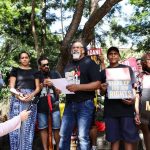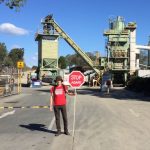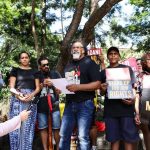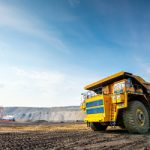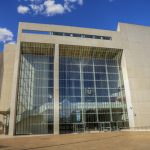The Stop the Adani Convoy: An Interview With Bob Brown

Date published: 22 March 2019
Adani announced last November that it plans to go ahead with a self-funded and scaled-down version of the overwhelmingly opposed Carmichael thermal coal mine in the central Queensland Galilee Basin.
This is following the Indian mining giant’s inability to secure any private sector investment both here and overseas, after environmentalists successfully pressured financial institutions into boycotting the Adani project.
At present, the terminally-delayed mine still needs to receive two environmental clearances. One relating to the endangered black-throated finch from the state government. And the other is from the federal government in regard to the groundwater impact the mine would have.
There’s the challenge from the Wangan and Jagalingou Traditional Owners that’s set to go before the full bench of the Federal Court in May. They claim that the Indigenous land use agreement (ILUA) that’s essential for the mine to go ahead is void.
And now, the Bob Brown Foundation is about to launch the Stop the Adani Convoy, which will depart from Hobart on 17 April and make its way through Melbourne, Sydney and Brisbane, before it arrives in the Galilee area.
History repeats
As director of the Tasmanian Wilderness Society, Bob Brown led the blockade to protest the damming of Tasmania’s Franklin River in mid-December 1982. The renowned environmentalist believes the upcoming convoy has the potential to outnumber that landmark demonstration.
Thousand’s took part in the three month blockade in Tasmania’s southwest, which brought the cause front and centre of public debate as a federal election loomed. And following its win in the March 1983 election, the new Hawke Labor government intervened to stop the dam.
Mr Brown expects many Australians will join the Stop the Adani Convoy as it makes its way across the country. And the founder and former leader of the Australian Greens and his fellow protesters will hold a rally, after the convoy rolls into Canberra in early May, right before the federal election.
Driving the message home
Gautam Adani is the Indian billionaire at the head of the Adani Group. At an April 2017 meeting in New Delhi, then Australian prime minister Malcolm Turnbull told Adani not to worry about a recent Federal Court decision that threatened the mine, as “the issue needs to be fixed and will be fixed”.
And in June that year, the Liberal Nationals government passed what became known as the “Adani Bill”, which amended the Native Title Act. The move secured the passing of the disputed ILUA, clearing the way for the Indian company to go ahead with the mine.
Currently, both major parties are supporting Carmichael. But, there are vocal campaigns calling on Labor to shift its position. And the Bob Brown Foundation’s convoy plans to drive this issue into the frontline of the election debate.
Sydney Criminal Lawyers spoke to Bob Brown about the momentum the pending protest is gaining, the impact that the thermal coal mine would have if it went ahead, and what Australians should consider when voting in the coming federal election.
Firstly, the Stop Adani Convoy is going to begin in Hobart n mid-April. Mr Brown, what sort of support does the convoy have so far?
The support is great. I’m currently in Queensland. And the biggest support is coming from Queensland itself.
But, we’re right across the board getting people saying they want to come. Some are doing a little bit. Some are doing a lot. People want to join in.
It’s a big commitment. It’s going to take quite a lot of time and some money, because people have to look after their own accommodation and meals and so on.
But, we’ve got 450 definitely signed up. And that’s growing every day. Originally, we had 1,800 expressions of interest. Now, people are working out where they’re going to stay. How they are going to get there.
The applications keep rolling in.
How much less of an impact would the newly proposed scaled-down Carmichael mine have upon the environment compared to the original full-scale model?
If you’re concerned about the planet, zero. They are going to take every ounce of coal out, but at a slower rate. And burn it and put the greenhouse gases into the atmosphere. The exact same amount.
Secondly, they will put in the infrastructure to their mine, which opens up the way for five or six other huge coal mines in the Galilee Basin.
So, the impact is enormous. The downscaling is not because Gautam Adani has suddenly become a greenie. It’s for their own purposes.
The fact is at the end of this century, looking back, it won’t matter what rate the coal was taken out. It is all going to be taken out, burnt and heat the planet.
Opposition to the Adani mine has been growing. In your understanding, how much opposition to the project is there amongst the public?
Well, the polls show it is over 70 percent. And, as we saw just, there was protest in the Western Australian parliament about the Adani mine. It’s everywhere.
Everywhere I go, I am pulled up by people who say, “What are you going to do about Adani? How do we stop Adani?”
It’s a litmus test for the growing fear, even terror, that people have about the planet’s biosphere – which gives us life – being damage irreparably.
At this moment in time of rising climate change, as well as rising awareness about it, what do you think about the two major parties still in support of a huge thermal coal mine like Carmichael going ahead?
Well, they’re captured, aren’t they? By the old polluting industry. As far as jobs are concerned, Adani is committed to automating: getting rid of as many jobs as possible.
And there are cogent studies to show that it actually will be a net loser of jobs in the coal industry, because exporting its coal will reduce the market for already operating coal mines elsewhere. But, the big job creator is renewable energy.
And certainly, on the Barrier Reef, there are 60,000 people who work in tourism, showing people the reef. And it’s half dead due to global warming. Due to burning coal. Due to people like Gautam Adani.
The convoy is set to hit the region of the Galilee area mid-way through its journey. For those on the convoy, what should they expect when they arrive in the region of the mine site?
Of course, you can’t go to the mine site itself, because they’ve got security guards and so on. But, the traditional owners who are opposing this mine have said they will welcome us into the area.
And recently, farmers in Queensland took a petition to state parliament against the disruption of the Artesian Basin – the water – that this mine is going to be involved with.
There is great support for a peaceful, lawful standing up to a very destructive operation, which is going to impact on every Australian, their children, and indeed, people right around the world, as it helps heat an already overheated planet in the years ahead.
You were involved in the Franklin Dam Blockade, which resulted in the newly elected Hawke government bringing a halt to the project. How would you say that experience has informed you in organising the Stop Adani Convoy?
The first thing is that Bob Hawke had the leadership to say, “I will stop the dam.” And even though, he lost a couple of seats in Tasmania, he won a whole line up of seats on the mainland.
Of course, we now know that one of the best things that ever happened to Tasmania was instead of going into debt for another dam, we’ve got a global icon attracting people and creating jobs in Tasmania.
Just recently, in the case I took to the High Court with fellow protester Jessica Hoyt, it was ruled that peaceful protest is part of our democratic rights.
So, the question is, will we all sit on our hands? Are we all going to be part of the loss of liveability on the planet? And loss of beauty? And loss of spiritual connection on the only planet that gives us life?
Or are we going to do something? And the convoy is about doing something.
And even people who can’t come can contribute, because it’s a very expensive operation for a very small organisation, like our foundation. We’re open to people helping us all along the way.
And it’s part of democratic protest. It’s immediately before the election to remind people that they can do no better than decide their vote according to which party, and which candidates, are going to stop this mine and stand up against global warming.
And lastly, Mr Brown, your aim is to see the end of the Adani mine. How do you foresee the convoy bringing this about? How do you hope this plays out?
As with the Franklin Blockade, it gave national attention to a beautiful place about to be destroyed immediately before an election. And hundreds of thousands of voters changed their vote to save it.
Here, we’ve got a massive project about to get underway to degrade the whole planet. And voters have to work out, when they’re going up the school path to the ballot box, whether they’re going to support that.
Australians have just got to make sure they do vote for their children, and not just the immediate tax break, or whatever immediate, self-seeking thing is offered by the candidates for parliament.
This is about the planet. It’s about our children. And our fellow species. It’s about life on Earth. It’s a critical vote for Australians in May.
And the convoy is to make sure the environment, this time, is not taken off the agenda in the last week or two before an election.


